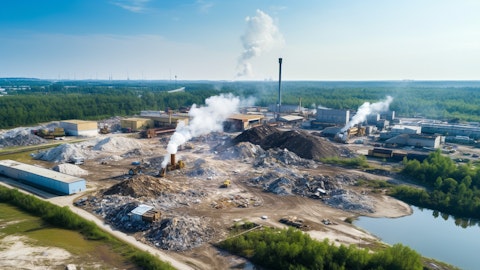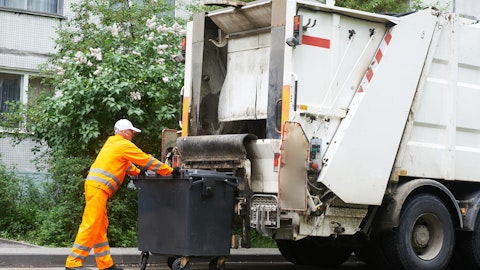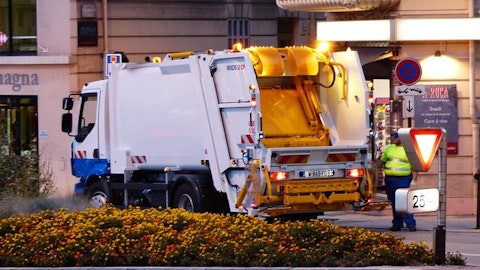Ned Coletta: Yes. So, sometimes percentages are our friends and sometimes they’re not. And in this case a lot of our business is done on a dollar basis. So if you think about the transfers in certain markets were at $80 to $90 a ton gate rates, and we’re passing through a $1 increase to cover dollar-based cost increases and say you have a $4 increase on an $80 chip you’re at 5%. Now, you get to a landfill and you have $4 on a $40 chip rate say, $4 you’re 10%. So a lot of what happens in the market especially on the disposal side transfers and landfills are more dollar-based increases. And as you get to this really high transfer rates Michael in our footprint, because there’s so much transportation that’s occurring between transfer stations and landfills the percentages are a little bit lower, but we’re still getting the dollars, and that’s an important part of it.
And then to your point, we really haven’t seen New York City fully ever recover from COVID. And that’s been a reduction in tons across the entire Northeast, across this period. We expect additional facility closures in the next couple of years, which will continue to put some pressure on the market. But where we sit right now, we’re still seeing good pricing in the marketplace, even with economic activity, maybe slowing a little bit, and then the special waste coming off, we’re not seeing any competitive actions to reduce pricing. We’re seeing everyone in the market hyper focused on getting adequate returns in this complex regulatory environment.
Michael Hoffman: Okay. And then good get on Brad well regarded. I spent a lot of time with them over the years in his role at Covanta, and prior to that as a banker, where is he going to be located?
Ned Coletta: He’s coming to Vermont.
Michael Hoffman: Very good.
John Casella: Yes. There’s a lot of people that really like Vermont Michael come on –
Michael Hoffman: He’s got a family and kids and all that and he’s been in Trenton New Jersey a long time. It’s like good for you. It’s not that Vermont.
John Casella: There’ll be a transition period where they’ll be back and forth for a period of time.
Ned Coletta: Yeah. But our business extends down his way as well. It’s exciting for our entire team here. It’s exciting for me from a balance standpoint. And there’s a lot we’re working on here is the team from organic and acquisition development standpoint. And we have a lot of great opportunities in front of us. So to have another strong team member join us is exciting.
Michael Hoffman: Very good. Thank you.
Ned Coletta: Thank you, Michael.
John Casella: Thanks, Michael.
Operator: Please stand by while we compile our next question. Our next question comes from Tyler Brown from Raymond James. Please go ahead.
Tyler Brown : Hey, good morning, guys. I don’t know if Brad is out in TV land, or not but just really looking forward to working with him again. But I am a little bit confused in that. So, was weather an EBITDA headwind in the quarter? EBITDA dollars?
Ned Coletta: Yeah, it was. So we gave in the margin bridge on a 15 basis point headwind from the flooding. So that’s the one aspect we looked at in dollars, Jason, it’s several hundred thousand dollars.
John Casella: It was not at all that material. Yes the headwind. You’re right there, Tyler.
Tyler Brown : Okay. If we come back to volumes and I’m specifically interested in collection volumes. So, I think you said, they were down maybe 2%. You called out resi. But can you talk about how volumes are trending in small container and large container, are you seeing any weakness there?
Ned Coletta: So in the small container a little bit it was down 0.4%, but nothing all that material and the trend there has been stable throughout the year. Roll-off were down 1%. But once again, a lot of work there to improve margins. Our margins were up actually 400 basis points in that line of business year-over-year. So we’re really focused on quality of revenue and pushing adequate pricing in that line of business. So that’s one that really is showing the right direction.
Tyler Brown : Okay. And then did I hear you correctly? Did you say that Twin Bridges would add $8 million in the quarter?
Net Coletta: Yes. So, we’ve had a couple of other small acquisitions in total between Twin Bridges and the other small acquisitions. We’re an $8 million contribution, not just in the quarter but from our last guidance to end of the year. So, Twin Bridge is we brought online on September 1. So we have about a third of the year and we expected about $18 million of EBITDA through the first year. And we’re tracking at that. We have about $6 million, $6.5 million in our guide from September through the end of the year. And then we have a couple of smaller acquisitions that are contributing as well. So it’s $8 million in total
Tyler Brown: Okay. Yes.
Ned Coletta: And in our Mid-Atlantic region is tracking — sorry, Mid-Atlantic tracing right to pro forma in the last decade.
Tyler Brown: Okay. Perfect. That’s helpful. A couple of little — when does the Highland expansion go into effect?
John Casella: We’re in permitting right now. I mean I think the biggest threshold issue is behind us in terms of the host community agreement. And now, it’s just a matter of getting through the regulatory environment with New York DEC, Tyler. I think that it’s probably months away, probably another quarter or two to get through the process. But we don’t anticipate any surprises there. Like I said, the most difficult and most important aspect is to get through the host community agreements which are done.
Tyler Brown: Okay and so my last one here. So when we think big picture about the building blocks for next year, so we obviously have the GFL rollover the Twin Bridges and others rollover. There may be some acquisition synergies in there. I’m curious if you’re including that in your number. You have the Boston restart organic growth. But then more when we think about 2025 is when potentially something from Highland or McKean, those would be additive probably further down the road?
Ned Coletta: Yes. That’s a great perspective. Highland, really that becomes more material as the Allied Niagara landfill closes up in the Buffalo market. Our asset is about 45 miles from the Buffalo marketplace and will really help to serve that need in that market. And when we look to McKean, it’s going to be a slow math as we’ve said before. The construction is going extremely well. The infrastructure is nearly built and we expect to be in a position where we can be online in early spring. But things like railcars or containers the like, are definitely slowed down. But from our vantage point, this is a long long-term play and we’ve always planned us ramping up slowly and you’ll start to see a little impact in 2024, more material impact into 2025.
Tyler Brown: Yes. Okay. Perfect. Well, thank you, guys.
Ned Coletta: Thanks Tyler.
Operator: Thank you. Please stand by, and our next question comes from Jon Windham from UBS. Please go ahead.
Jon Windham: Hey, great. Thanks for taking the questions. I’ll echo the sentiment, congratulations on the hiring of Brad. That’s a really good hire. Maybe in line with that Ned, I’d ask maybe can you expand a little bit on how you think about your priorities after transitioning the CFO role. Is it about more integration or further expansion? Just any thoughts you have on how you think about your next year? Thanks.
Ned Coletta: Thanks Jon. So, I’ve been balancing a lot of hats in the last year. And when Ed Johnston retired in July of 2022, we reshuffled and responsibilities across the board with our senior team. And from my advantage point, when Brad hits the ground, I want him to be successful and give him what he needs to transition successfully. And now we’ll continue to focus on development projects. We have a couple of key organic development projects as you’re aware that we’re looking to bring to completion. I’m spending a lot of time on the systems side of the house as well. There’s a lot going on there both from the integration of our acquisitions and also forward-looking, and then I’ve been working deeply with the Resource Solutions team, landfill teams to help drive value in their business units and partnering with Sean and his team as well on the operating front. So there’s a lot of ground to cover, and I suspect I won’t be onboard.




